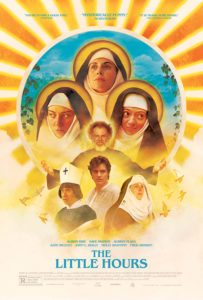Film Review: The Little Hours: Nuns-Gone-Wild with a Bit of Truth to Boot

“Trash, pure trash,” is not the usual critic’s blurb most directors hope for when they promote a movie. Of course, director and writer Jeff Baena’s The Little Hours is not your typical tale of nuns in a fourteenth-century Italian convent. The film earned that inflammatory summary from the Catholic League’s Bill Donohue for its salacious and comedic depiction of nuns as crass, sexually curious individuals who found themselves in habits not because of an undying devotion to God, but because in 1347 there weren’t many other options.
Sister Alessandra (Alison Brie) is waiting for her father to produce a big enough dowry so she can marry and leave the convent. Sister Fernanda (Aubrey Plaza) sneaks off into the woods for pagan witch rituals. And Sister Ginerva (Kate Micucci) represses her latent homosexuality by being the convent’s resident tattle-tale. After repeated instances where the three nuns yell profanities and hurl vegetables at the convent’s groundskeeper, he quits, necessitating Father Tommasso (John C. Reilly) to hire Massetto (Dave Franco) who is on the run from Lord Bruno (Nick Offerman).
With his good looks and wholesome demeanor, Massetto catches the attention of the three nuns who use him to explore their budding sexuality. While the plot may sound like a steamy, morally conflicted drama, it’s clear from the first scene where Fernanda and Ginerva yell, “Hey, don’t f***ing talk to us!” at the friendly groundskeeper, that the film is a silly farce through and through.
The movie’s comedy foundationally rests on the unexpected image of sarcastic nuns rolling their eyes and freely cussing at whoever annoys them. This is a surprisingly successful tactic as it never seems to get old within the context of the movie as newer and wider boundaries of absurdity are pushed, from Father Tommasso consistently drinking too much communion wine to an elderly nun walking in on Alessandra and Massetto in the heated throes of passion, oblivious to their presence and activity.
While the film’s charm is in its “nuns-gone-wild” theme, the spicy storyline is actually not too far off from the events depicted in Giovanni’s Boccaccio’s The Decameron, the collection of novellas Baena drew inspiration from while writing The Little Hours. These novellas told erotic and comedic stories of those living in the Italian countryside as The Black Plague spread throughout cities in the fourteenth century. During his research for the film Baena interviewed religious scholars and learned that a lot of these raunchy medieval tales were factual. Therefore, in response to the backlash Baena has received from Catholic groups about the film, he told Indiewire earlier this month that, “These protesters want to whitewash history and present it as though basically all of these people were saints, when in reality they were real people who had just as rich of an interior life and emotions and desires as we do.”
No part in the film echoes this sentiment more than when Alessandra sits face to face with an old, wrinkled nun and forlornly realizes her future at the convent would be one of loneliness and despair. This sad moment of truth gives an elevated meaning to all the wild antics these very human people of God get up to. Rather than living in full piety, the characters want to explore and experiment all life has to offer. The film is so clever because it places these normal human desires of lust and adventure into the personalities of nuns, showing simultaneously the constrictive limits of religion as well as the imperfections of humanity.
